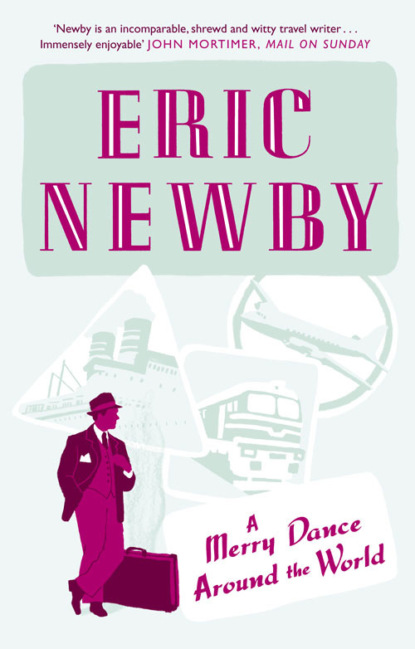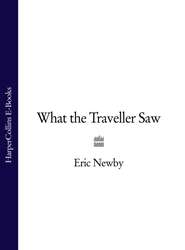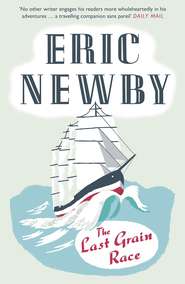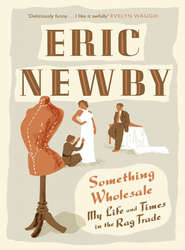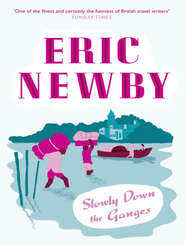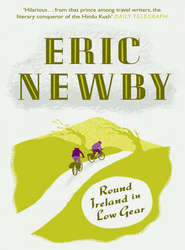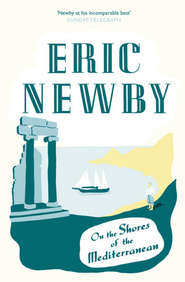По всем вопросам обращайтесь на: info@litportal.ru
(©) 2003-2024.
✖
A Merry Dance Around the World With Eric Newby
Автор
Год написания книги
2019
Настройки чтения
Размер шрифта
Высота строк
Поля
Altogether – leaving present for the headmaster (the Estates of Bemersyde), although he had not been a very good headmaster, the boys (or what was left of them, for it had been rather a rough school with a lot of mud in the playing fields) now going out into the world to seek their fortunes – there was a distinctly end-of-term feeling in the air. But in spite of this there was no singing of ‘Lord Dismiss Us With Thy Blessing’ as one would perhaps expect on such occasions and as there was at the schools I later attended. Possibly because the only songs the boys knew were not hymns but songs that had become dirges: ‘Pack Up Your Troubles’, ‘Tipperary’, ‘It’s a Long Long Trail A’Winding’ and ‘I Don’t Want To Join The Army’.
Even the Ministry of Munitions and the Admiralty were selling up. That day and every day there were offers for sale by auction of aerodromes, enormous munition factories, equally enormous hutted camps, and of minesweepers, motor charabancs, fleets of ambulances, ships’ boilers, railway engines, enough barbed wire to encircle the earth, millions of cigarettes in lots, miles and miles of ships’ hawser, inexhaustible supplies of bell tents, cereal ovens, lower fruit standard jam, wicker-covered stoneware jars, torpedo boats, with and without engines and part-worn and unworn issue clothing, etc., etc., etc., so inexhaustible that many items were still being sold off twenty years later on the eve of the next world war, when the whole stocking up process began all over again. Everything, except projectiles and the means of discharging them, was open to offer and even these would eventually come on the market, but for export only.
In fact the world was changing with a rapidity that would have been unbelievable in 1914, even though it was still possible to buy red plush breeches for footmen and under nurses could still be acquired with comparative ease. Yet it was, one sees in retrospect, only a temporary acceleration. If it had continued at the rate envisaged in 1919 man would probably have stood on the moon by 1939.
That afternoon the muffin man ringing his bell went down Riverview Gardens, the side road outside ‘Ther Mansions’ as the local tradesmen who dealt with my mother called them, in which there were other blocks of flats, carrying his muffins in a wooden tray covered with a green baize cloth, which he balanced on his head; and the lamplighter came and went on his bicycle (lighting-up time that evening was 4.21 p.m.), lancing the gas lamps in the street into flame with a long bamboo pole.
And so ended my birthday. For all concerned it had been a jolly long one.
The truth is that babies do not like travel, and I was no exception. Babies are unadventurous. Babies act as grapnels to prevent ‘the family’ dragging its ground. That is why they were invented. Perversely, their desire for fresh horizons comes much later when they have already begun to ‘attract’ fares, and can no longer travel free; by which time they are no longer babies at all.
I remember the Isle of Wight as the place where I first sat in the side-car of a motor cycle, at Easter 1923, but much more I remember it as being the Place Where God Lived, although this was later, some time in the summer or autumn of 1925. It must have been during one of those interpolated holidays my mother was so adept at arranging at an instant’s notice if my father had to go abroad without her, on the grounds that a change of air would do me good. He often used to go to Holland to sell enormous coats and costumes to the Dutch. With her she took her sister, my Auntie May, who loved travel, however banal.
On one occasion we made an excursion to a place near the middle of the island and some time in the afternoon of what I remember as a very hot day we arrived at our destination, a village of thatched houses that were clustered about the foot of a green hill, on the summit of which stood what seemed a very small church.
(#ulink_95e632aa-ab07-52fb-83c7-2539c5c2f0f4) From where we stood it was silhouetted against the now declining sun, the rays of which shone through its windows, producing an unearthly effect.
There was no time to climb the hill to the church and have tea as well. If there had been, I am sure that my mother and my aunt, both of whom were interested in ‘old things’, would have done so. Instead, we had the tea, in the garden of one of the cottages, and while we were having it I heard my mother and my aunt talking about the place and how nice it was, which they called Godshill.
I was very excited. Godshill. If this was Godshill then God must live on it. God to me at this time and for long years to come was a very old, but very fit, version of Jesus and much less meek-looking. He had a long white beard, was dressed in a white sheet and was all shiny, as if he was on fire. He also had a seat in the front row of the dress circle, as it were, so that he could see immediately if one was doing wrong. This was the God to whom I prayed each night, either with my mother’s help or with whoever was looking after me.
‘Does he live on it?’ I asked my mother.
‘Yes,’ said my mother, ‘that’s where he lives, darling, on top of the hill.’
I was filled with an immense feeling of happiness that this radiant being, whom I had never actually seen but who was always either just around the corner or else hovering directly overhead but always invisible, should live in such a shining, beautiful place; and I asked if we could climb the hill and see him. Unfortunately, the train was due and we had to hurry to the station. I cried all the way to it and most of the way back to Bembridge. I never went back to Godshill and I never will.
I can remember, in July 1923, being carried high on my father’s head through the bracken in the combes that led down to the beaches on Sark, and once having reached them I can remember falling down constantly on the rocks and hurting myself, I considered, badly. And it was on Sark that I had my first remembered nightmare, in the annexe to Stock’s Hotel, a charming, ivy-clad, farmlike building. I awoke screaming in what was still broad daylight with the sun shining outside my first-floor room in which the blinds were drawn, to think myself abandoned to a dreadful fate by my parents who were dining only a few feet away in the hotel, certain that I had ‘gone off’ to sleep. It was a nightmare of peculiar horror, because it was founded on fact; so horrible and at the same time so difficult to explain to anyone that for years I dared not confide the details to anyone, and to my parents I never did, although it recurred throughout my childhood, together with an almost equally awful one about falling down an endless shaft.
WESTWARD HO!
In 1925, when I was five and a half, we embarked on what, so far as I was concerned, was the most ambitious holiday I had ever had. In summer my father took a cottage at Branscombe, at that time a very rural and comparatively unvisited village in South Devon, between Seaton and Sidmouth. It promised to be a particularly exciting time as my father had decided that we should travel there from Barnes by motor. This meant that most of our luggage had to be sent in advance by train from Waterloo to Honiton, a market town on the main line to Exeter; at Honiton it was picked up by a carrier and transported the ten miles or so to Branscombe by horse and cart. Others taking part in this holiday, although they did not travel with us, being already foregathered there, were my Auntie May (the aunt who had accompanied my mother and me on the memorable visit to Godshill) and her husband, Uncle Reg. Before the war Uncle Reg had worked as a journalist in Dover on the local paper and in this capacity had been present in 1909 when Blériot landed on the cliffs, having flown the Channel. During the war he had been in the navy in some department connected with propaganda. Later he became editor of the Gaumont British Film News. He was very urbane and elegant. He was later on good terms with the Prince of Wales for whom he used to arrange film shows at Fort Belvedere, and for the Royal Family at Balmoral. For these services he was presented with cufflinks and cigarette cases from Plantin, the court jeweller, as well as other mementoes. He preferred to be called Reginald rather than Reg, but no one ever did so. They put up in the village pub where we, too, were to take our meals.
The third party was made up of three fashion buyers for London stores, Beryl, Mercia and Mimi Bamford, all of whom were friends of my mother, particularly Mimi, and their mother. All three were unimaginably elegant, often almost identically dressed in long, clinging jerseys and strings of amber beads, and they were surrounded by what seemed to be hordes of extremely grumpy Pekingese who did not take kindly to the country. Their mother, who did not take kindly to the country either, was even more formidable. She owned a Boston Bulldog called Bogey, which had had its ears clipped, a practice by then declared illegal. Like her daughters she was immensely tall, and must at one time have been as personable as her daughters, but even I could recognize that she was incredibly tough, if not common.
‘She didn’t ought to ’ave ’ad ’im,’ was the comment she made about me, by now a boisterous, active little boy, to my Auntie May while we were at Branscombe, ‘she’ being my mother; an anecdote that my aunt eventually told me, which she did with an excellent imitation of the old lady’s gravelly voice, having put off doing so until only a few years before her own death in 1974 in order, as she put it, to spare my feelings.
Neither Beryl nor Mercia nor their mother ever went to the beach, or even set eyes on the sea, the whole time they were at Branscombe. For Beryl and Mercia the seaside was Deauville. What Branscombe was to them is difficult to imagine, or they to the inhabitants. Only Mimi relished the simple life. The journey to Branscombe, a stately progression, took two days.
At Branscombe, behind the Mason’s Arms, the pub which stood next door to the cottage my father had taken for the summer and of which it formed a part, there was a yard surrounded by various dilapidated outbuildings and a piece of ground overgrown with grass and nettles which concealed various interesting pieces of rusted, outmoded machinery, the most important of which was an old motor car smelling of decaying rubber and dirty engine oil. The stuffing of what was left of its buttoned leather upholstery was a home for a large family of mice. This yard was to be the scene of some of the more memorable games I played with my best friend in the village, Peter Hutchings, whose mother kept a grocery, confectionery and hardware shop on the corner opposite Mr Hayman, the butcher’s. It was from Peter Hutchings, who was killed while serving as a soldier in the Second World War, and whose name is inscribed with the names of fourteen other village boys who died in the two great wars on the war memorial at the entrance to Branscombe churchyard, that I learned the broad local dialect which was so broad that by the end of that first summer at Branscombe no one except a local inhabitant could understand what I was saying. ‘Sweatin’ like a bull ’er be,’ was how Peter Hutchings described to me one day the state of his sister, Betty, confined to bed with a temperature, and it was in this form that I passed on this important piece of news to my parents.
There in the inn yard, in the long summer evenings, we used to sit in the old motor car, either myself or Peter at the wheel, taking it in turn, the driver making BRRR-ing noises, the one sitting next to him in the front making honking noises – the horn had long since ceased to be – as we roared round imaginary corners, narrowly missing imaginary vehicles coming in the opposite direction, driving through an imaginary world to an imaginary destination on an imaginary road, a pair of armchair travellers. In the back we used to put Betty Hutchings, if she was available, who wore a white beret, was placid, said nothing, apart from an occasional BRR, and was in fact an ideal back-seat passenger. Sometimes, if we felt like doing something ‘rude’, we used to stop the car and pee on the seats in the back, and Betty would pee too. This gave us a sense of power, at least I know it did to me, as I would not have dared to pee on the upholstery of a real motor car belonging to real people. Less courageous than my wife, who confessed to having peed on the back seat of a ‘real’ very expensive motor car stopped outside her parents’ house at her birthplace in the Carso, and smeared it with cow dung.
When we got tired of driving our car we ourselves used to become motor cars, tearing up and down the street outside making BRRR-ing noises of varying intensity as we changed gear, disturbing the elderly ladies who used to sit at their cottage doors making Honiton lace, pillow lace, appliqué and guipure, the principal manufacture of the village. Close by, over the hill at Beer where there were stone quarries, the quarry men’s wives had made the lace for Queen Victoria’s wedding dress in 1839, something that was still talked about in the neighbourhood more or less as if it had happened yesterday. It was these hideous BRRR-ing noises that no doubt prompted old Mrs Bamford, whose cottage also faced the main street, to utter the words, ‘She didn’t ought to ’ave ’ad ’im.’
But all this was in the future, that first day of our holiday.
The next morning I woke at what must have been an early hour and, obeying some mysterious summons, dressed myself in the clothes that I had worn the previous afternoon – white shirt, shorts, socks and white sun hat (I couldn’t manage the tie unaided), brown lace-up shoes from Daniel Neal’s in Kensington High Street (soon to be replaced by hobnail boots, bought for me at my earnest request so that I could be a real country boy, which took me ages to tie) and my pride and joy, a hideous red and green striped blazer with brass buttons that I had persuaded my mother to buy for me, much against her will, from Messrs Charles Baker, Outfitters, of King Street, Hammersmith, so that I should look more like what I described as ‘a real schoolboy’ rather than an infant member of the kindergarten at the Froebel School in Barons Court. As school blazers were not made to fit persons as small as I was, when I was wearing it my short trousers were scarcely visible at all. Not even Messrs Baker appeared to know which school it was, if any, that had red and virulent green stripes as its colours. Then, having picked up a stout stick that I had acquired the previous day, I stole downstairs and let myself out into the village street which was deserted as it was Sunday morning.
At the side of the road, opposite what I was soon to know as Mrs Hutchings’s shop, a little stream purled down from one of the side valleys, one of several such streams that, united, reach the sea at Branscombe Mouth; and there, under a brick arch, it issued from a pipe which supplied this lower end of the village with water, before burrowing under the road to reappear once more outside the shop. From here it ran away downhill over stones along the edge of a little lane with an old, ivy-clad wall on one side of it, chattering merrily to itself as it ran over the stones in a way that seemed almost human.
Here, in this narrow lane, the water had what looked to me like watercress growing in it, and it was so clear and delicious-looking that I got down and had a drink of it, only to find that it was not delicious at all and that it had a nasty smell. Later I discovered that Betty Hutchings used to drink from this crystal stream if she was not watched which was probably the reason why she sweated like a bull.
I continued to follow the stream, racing twigs down it, until it vanished into a sort of tunnel from which proceeded a delightful roaring sound. At the other end it emerged beyond a wicket gate to flow more placidly under a little bridge and in these calmer waters I spent some time stirring up the bottom with my stick and frightening some water beetles, the air about me filled with the droning of innumerable insects.
From this point it ran to join the main stream in the middle of the valley and here the path turned away from it to the left beyond a five-barred gate which, because I could not open it unaided, I squeezed underneath, to find myself in a beautiful and what seemed to me immense green meadow, hemmed in by hedgerows and huge trees and filled with buttercups, while high above it to the right were the hanging woods we had seen the previous morning from the car, the open down above them alive with gorse.
At the far end of this field the now augmented stream was spanned by a small wooden footbridge with a white painted handrail. When I eventually reached the stream, in spite of all these distractions and making a number of more or less unsuccessful attempts to spear on the end of my stick some of the older, harder sorts of cow flop in which the field abounded, and launch them into the air, the water tasted even funnier than it had done in the village outside Mrs Hutchings’s shop and I stung myself on the nettles getting down to it.
Beyond the bridge the path continued uphill, dappled with sunlight under the trees, and here the air struck chill after the heat of the meadow. Then it dipped and suddenly I found myself out in the sun on the edge of an immense shingle beach which had some boats hauled out on it, and in my ears there was the roar of the sea as with every wave it displaced and replaced millions upon millions of pebbles. To the left it stretched to where a cluster of ivy-covered white pinnacles rising above a landslip marked the last chalk cliffs in southern England; to the right to the brilliant red cliffs around Sidmouth; and beyond it, out to sea, on what was a near horizon, for there was already a haze of heat out in Lyme Bay, I could see the slightly blurred outlines of what Harry Hansford, the local fisherman who lived opposite the blacksmith’s shop, would soon teach me to identify as a Brixham trawler, ghosting along under full sail.
‘Then felt I like some watcher of the skies
When a new planet swims into his ken;
Or like stout Cortez when with eagle eyes
He star’d at the Pacific – and all his men
Look’d at each other with a wild surmise –
Silent, upon a peak in Darien.’
Many years were to pass before I read these words of Keats, but when I did the memory of that morning came flooding back.
There was a sound of feet slithering on the pebbles behind me. It was Kathy, my mother’s help, panting slightly, as she had been running. ‘Whatever did you do that for, Eric, you naughty little boy, without telling me?’ she said. ‘Your mum’s ever so worried, and your dad, too. He’ll be ever so cross if he finds out where you’ve been. You’d better keep quiet when you get back. I’ll say I found you in the field.’
Together, hand in hand, we went back up the hill towards the village where the church bells were now beginning to announce the early service.
LANDS AND PEOPLES
By the time I was eight years old, apart from a visit to the Channel Islands in 1923, I had never been out of England, not even to visit Scotland, Ireland or Wales. Yet, in spite of this, I already knew a good deal about these places and their inhabitants, as well as the wider world beyond the British Isles.
This was because, some time in the 1920s, my parents took out on my behalf a subscription to The Children’s Colour Book of Lands and Peoples, a glossy magazine edited by Arthur Mee, at that time a well-known writer who was also responsible for the to me rather boring Children’s Newspaper, which I had given up buying in favour of more trashy, exciting comics. Lands and Peoples, according to the advertisements which heralded its publication, was to come out at regular intervals and when complete the publishers would bind it up for you to form six massive volumes.
What excitement I felt when Lands and Peoples came thudding through the letter-box, in its pristine magazine form. To me, turning its pages in SW 13 was rather like being taken to the top of a mountain from which the world could be seen spread out below, a much more interesting world than the one my father read bits out about from his Morning Post to my mother while she was still in bed, a captive audience, sipping her early morning tea.
Lands and Peoples was addressed to ‘The Generation whose business it is to save Mankind’ – mine presumably, although I had no suggestions to make about how it should be done. ‘We are marching,’ Mee wrote, an incurable optimist, apparently envisaging a pacific version of the Children’s Crusade, with the children waving white flags instead of brandishing crucifixes, ‘towards a friendlier and better world, a world of love in place of hate, of peace instead of war, and one thing is needful – an understanding of each other … it is the purpose of this book so to familiarize us with the lands and peoples of the world that we can cherish no ill-will for them. We are one great human family, and this is the book of our brothers and sisters.’
I never read the text. All the efforts of what was presumably an army of experts in their various fields, painfully adapting their ways of writing to render them intelligible to infant minds, were totally wasted on me. All I did, and still do, for I still have the six volumes, was to look at the photographs, of which there were thousands in black and white besides the seven hundred or so in colour, and read the captions and the short descriptions below them of a world which, if it ever existed in the form in which it was here portrayed, is now no more. What I saw was a world at peace, one from which violence, even well-intentioned sorts, such as ritual murder and cannibalism, had been banished, or at least as long as the parts kept coming.
In Merrie England, donkeys carried the Royal Mail through the cobbled streets of Clovelly, milkmaids in floppy hats churned butter by hand in the Isle of Wight, swan uppers upped swans on the River Thames, genial bearded fishermen in sou’westers mended nets on the Suffolk coast, town criers rang their bells, and choirboys wearing mortarboards, using long switches, beat the bounds of St Clement Danes.
In the Land of the Cymry, which is how Lands and Peoples described Wales, ancient dames wearing chimney-pot hats stopped outside their whitewashed cottages to pass the time of day with more modern, marcel-waved neighbours, and cloth-capped salmon fishers paddled their coracles on the River Dee.
In Bonnie Scotland, brawny, kilted athletes tossed the caber, border shepherds carried weakling lambs to shelter from the winter snows, women ground corn with stone hand-mills in the Inner Hebrides and, far out in the Atlantic, on St Kilda, the loneliest of the inhabited British Isles, men wearing tam-o’shanters and bushy beards were photographed returning homewards with seabirds taken on its fearsome cliffs.
In the Emerald Isle, bare-footed, flannel-petticoated colleens drew water from brawling streams, or knitted socks in cabins in Connemara, while little boys in the Aran Islands wore skirts to protect them from being kidnapped by the fairies.





